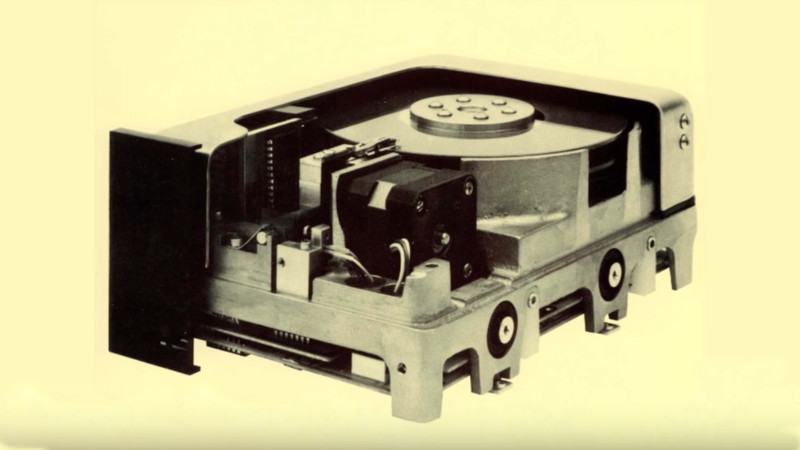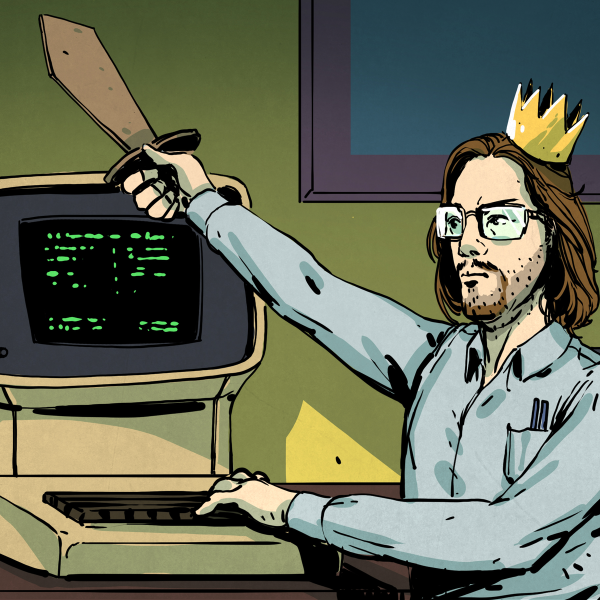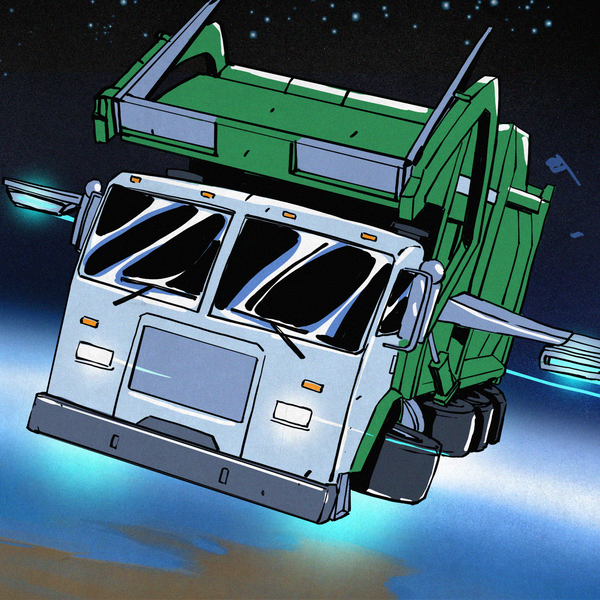Mass storage has come a long way since the introduction of the personal computer. [Tech Time Traveller] has an interesting video about the dawn of PC hard drives focusing on a company called MiniScribe. After a promising start, they lost an IBM contract and fell on hard times.
Apparently, the company was faking inventory to the tune of $15 million because executives feared for their jobs if profits weren’t forthcoming. Once they discovered the incorrect inventory, they not only set out to alter the company’s records to match it, but they also broke into an outside auditing firm’s records to change things there, too.
Senior management hatched a plan to charge off the fake inventory in small amounts to escape the notice of investors and government regulators. But to do that, they need to be able to explain where the balance of the nonexistent inventory was. So they leased a warehouse to hold the fraud inventory and filled it with bricks. Real bricks like you use to build a house. Around 26,000 bricks were packaged in boxes, assigned serial numbers, and placed on pallets. Auditors would see the product ready to ship and there were even plans to pretend to ship them to CompuAdd and CalAbco, two customers, who had agreed to accept and return the bricks on paper allowing them to absorb the $15 million write off a little at a time.
Unfortunately, the fictitious excellent financial performance led to an expectation of even better performance in the future which necessitated even further fraud. The company had turned around, but only on paper. A downturn in the computer business and maxed-out credit signaled the beginning of the end. Suppliers and employees weren’t getting paid. A senior manager violated insider trader rules and dumped a lot of stock.
The turnaround CEO finally resigned and a new CEO found the fraud and released the findings that they were in the hole for $100 million. Bankruptcy pushed the company’s assets to Maxtor and criminal charges against 16 people ensued ending in fines and jail time. It isn’t clear if any of the boxed bricks were shipped to anyone by accident or by a disgruntled employee with a rubber paycheck. [Tech Time Traveller] speculates that if someone has one, it would be quite the collector’s item.
We hear about companies doing questionable things, of course, but this really is impressive in scope. At least they weren’t scamming end users as some tech companies have done.

















“Once they discovered the incorrect inventory, they not only set out to alter the company’s records to match it, but they also broke into an outside auditing firm’s records to change things there, too.”
That sounds like a great idea for a Cyberpunk/Shadowrun adventure!
“broke into” seems very convenient for Price. Too convenient.
If they thought they could get away with faking inventories, they are a few bricks short of a full load.
I see what you did there.
Interesting, didn’t know about this, been through many HDDs from earliest times, cool info :-)
Thanks for posting.
We’ve heard of bricking a hard-drive, but it’s the first time I hear of hard-driving a brick!
Excellent. You win the Internet!
It was the worlds first “Solid State” drive!
The real question for HaD readers is how many bits of data can you store with a brick?
I reckon at least 2 maybe 3 as it has 6 ways to orient it.
Umm well you could still drill holes as data items this expand the store capacity in so many ways however many bits you wanted, heck even add a parameter for depth of holes as a form of exponent, pretty much non volatile though earthquake crack risk so add some conjunctive 3D axis hamming corrections across the brick just to be sure to be sure to be sure, as in if you are an enthusiastic Irish hacker who values threes, oh geesh ;-)
I remember that when supermarkets here in Germany first started selling computers, people bought them and then returned the boxes filled with bricks, so the weight would feel correct. Supermarket employees were too inexperienced or too busy to check…
When the first iPad was on sale there were several instances of people buying then returning them with the iPad replaced with various things, including thin slabs of modeling clay.
Don’t tell me they offered refunds in cash?
Otherwise that would be the world’s dumbest scam. To get the money, you’d have to tell them who you are.
Definitely depends on the return volume and business process. If there are many returns of the same item it can be tricky to solve the whodunnit. While working retail there were plenty of times we didn’t realize there was an issue until it was back on the shelf — with no clear way to determine the origin.
Recall when the Miniscribe brick scandal broke as I was working for one of their large hard drive distributors, not far from the Miniscribe headquarters and we had former Miniscribe employees and they didn’t seem too surprised.
I also recall that the very first IDE hard drive I ever saw was by Miniscribe as they were all MFM or RLL at the time.
I wonder if putting the Miniscribe label on the bricks reduced their reliability.
Today thay’d just brass it out: “They’re Ceramic Solid State Drives! Not all the performance numbers cited in ads will be reachable in the real world by all customers.
Write only drives.
The ultimate in data security.
Free chisel with every purchase.
I know I’ve heard of at least one case where someone bought a computer part at a big box retailer and found a brick inside the box. Could it be possible that rather than being an item return scam, it was an inventory scam that accidentlally got shipped to a retailer?
Of course the problem is that it would be hard to document as an actual inventory scam brick when there are so many other scams it could be, especially when you have to break the sticker to open it and find the brick inside.
This is a bit confusing. The larger part of that business was Tape not Hard Disk. Yet everything seems to remember them for hard drives. I lived almost across the Street (street was to our back fence) when this all went down in Longmont. At least one of many buildings was. My Dad worked for IBM near Boulder at the time and this was major news in my household. I had even gone into the place with him on one occasion. There were indeed bricks sent out in confusion to customer(s). Thats when everything broke down. The fallout did include a customer my Father was working on a mainframe with as well. I want to say it collapsed his project at the time. I wish I could remember more specifics but it was a long life ago and IBM moved us a lot around that time. Either way it was all crazy and even IBM was a victim of the fallout.
The whole business is just outrageous, it never ceases to amaze me what some people will stoop to.
Miniscribe and Maxtor Colorado — a couple of companies my hometown could have done without
I serviced, then sold, new IBM clones back in the late 80s and 90s. Both Maxtor and MiniScribe were the we carried. We got good prices so it was an easy choice.
As I recall, they were both decent drives. But MiniScribe became harder and harder to get so the buyer stopped buying them. That same buyer, who was the owner’s wife, also stole our commissions.
I think the straw that broke the camel’s back was one shipment of the drives and none of them worked. We could hear something rattling inside. Of course we couldn’t open them because that would invalidate the warranty. We returned them and I think we didn’t even get anything for them. We never ordered them again.
I recall a story like this. Some guy promised a high return on the investment, and he did initially, but it required new people always coming in.
I think he’s still in prison.
That would be Bernie Madof, who “made off” with about 50 BILLION dollars of investors money, including a lot of pension funds and mon-profits. A lot of old folks lost their life savings and were literally cast out into the street. Individuals and companies large and small were RUINED. Bernie got 150 years in prison. When he protested that such a long sentence meant that he would die in prison, the judge told him, “that is exactly what I intended”. Bernie Madof, believed to be the perpetrator of the largest Ponzi scheme in history, did indeed recently die in prison.
The original was Ponzi.
I admire him, he invented a new crime.
My life’s ambition is to do that.
My metric will be how many nations make it illegal within 24 hours of finding out what I was doing.
God damn computer fraud and abuse act ruins the plan. Any federal judge can retroactively make anything he doesn’t like illegal faster than he can say: ‘Ipsofacto, shmipsofacto. I don’t like it.’
Madoff’s ‘victims’ knew he was a criminal, they just thought he was ‘their criminal’, who would eventually take the insider trading charge for them. Serves them all right. ‘Were lucky to get together with their money in the first place.’
New Crime? I believe the term Ponzi is named after a different fellow named Charles.
My wife worked at a big box computer store in the early 2000’s. Probably half of her coworkers were involved in various buy-return-reimburse scams. It was practically a perk of the job. I’m pretty sure the theft from within greatly outweighed the minor theft from shoplifters. She nearly quit but they all got arrested on what they later called Black Friday.
MiniScribe was to be the main hard disk supplier for an automotive project I was working on when this was going down. Because of temperature, we ran into problems that required modifications of the drive’s control firmware. We had daily meetings to discuss issues and progress, and one week the main firmware engineer disappeared suddenly midweek and they told us he would not be back by the end of the project. Turned out, he was in jail.
We got our initial production run going successfully but a few months later, MiniScribe had a company picnic. One of their employees was not able to attend because he was at our location in Michigan. According to the ex-employee, who filled us in on the news that afternoon after some frantic phone calls, when the employees who did attend the picnic attempted to return to their desks, they were all locked out and could not even retrieve their personal belongings. Bet they wished they had one of those bricks then!
And yes, the bricks definitely did get shipped around, multiple times. The fraudsters had been very careful to match the weights of the bricks to the drives. It was all very deliberate according to my contact. The earlier arrests we’re supposedly due to inventory theft, so there were multiple levels of grift going on over there.
I’ll bet the investors were mortarfied to hear about this.
Amazing story! I live nearby and don’t recall this at all. I’d love to know where the warehouse is. Lots of details at https://en.m.wikipedia.org/wiki/MiniScribe
My first hard disk was a MiniScribe 80 MB MFM unit, purchased through a Computer Shopper ad for just over $500. That was around 1986 and I put it in a scratch built system with an IBM PC/AT motherboard. MiniScribe was THE drive to have at the time. I always wondered why I couldn’t buy them when I needed more storage a few years later.
Love the story. I remember those days so well as a young engineer. The original buildings are still here and there if you know what to look for. Would go onto Storagetek till they went into meltdown. It was an exciting time.
Many parallels to the MediaVison (sound card maker) fraud from the same era. As I recall, this time the culprits hid an entire warehouse of defective or returned sound cards from the auditors.
Seagate was the original, ‘bad drives are still valuable inventory’ scammers (20-40 MB drive days).
They also revised their plan and actually shipped many thousands of known bad drives to customers.
I wouldn’t touch a Seagate drive for a decade or more, until it was down to 3 choices and the original Seagate was 4+ corporations ago.
Back when CompuUSA was around with stores I bought a 2.5 ide drive that was labeled on the box as 100gb. The biggest at the time. Got home opened it up and found a 20gb drive. The box still had the factory seal and plastic case on it. So it wasn’t a return scam. Knowing they wouldn’t believe me I took it back anyway. Yep sure enough they assumed I was trying to pull the scam. The manager told me to come with him he walks to the shelf and pulls the last one. We walk back to the customer service desk. He opens the off the shelf box, and guess what. It had another 20gb drive in it. He told me he still didn’t believe it and told someone to call it in or something. But I did get my refund.
That’s funny. After Computer City was bought by Radio Shack/Tandy, I bought a video card there once. There was a card in the box, but it was some cheap-o NE2000 network card or something similar. They didn’t give me any trouble, though. I always felt like they had seen it before. My issue with CompUSA was buying HP toner carts that had been “returned”. Often, someone would try to refill their cartridge, fail, buy a new one, put the old bad refill in the box and return it. I missed that once and ruined a very expensive laser printer. Sigh.
I have a 10MB MiniScribe HDD waiting to be tested (a real one, not the brick version). It was taken out of an IBM 5160 back on 1986 when it was replaced by a seagate ST-225. I have the original controller card and some XT mainboards. Do you think it would boot?